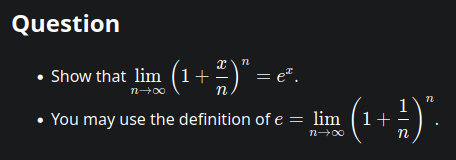this post was submitted on 09 May 2024
22 points (100.0% liked)
Daily Maths Challenges
208 readers
1 users here now
Share your cool maths problems.
Complete a challenge:
- Post your solution in comments, if it is exactly the same as OP's solution, let us know.
- Have fun.
Post a challenge:
- Doesn't have to be original, as long as it is not a duplicate.
- Challenges not riddles, if the post is longer than 3 paragraphs, reconsider yourself.
- Optionally include solution in comments, let it be clear this is not a homework help forums.
- Tag [unsolved] if you don't have a solution yet.
- Please include images, if your question includes complex symbols, attach a render of the maths.
Feel free to contribute to a series by DMing the OP, or start your own challenge series.
founded 9 months ago
MODERATORS
you are viewing a single comment's thread
view the rest of the comments
view the rest of the comments


solution
lim (n → ∞) (1 + x/n)^n= e^( lim (n → ∞) ln( (1 + x/n)^n ) )
= e^( lim (n → ∞) n * ln(1 + x/n) )
= e^( lim (n → ∞) ln(1 + x/n) / (1/n) )
= e^( lim (n → ∞) (1/(1 + x/n) * -x/n^2) / (-1/n^2) ) → L'Hôpital
= e^( lim (n → ∞) x / (1 + x/n) )
= e^( x / (1 + 0) )
= e^x
I'm at least 60% sure this proof isn't somehow circular